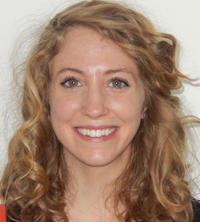
Carlee Toddes
PhD Thesis
Mu opioid receptor modulation of social behavior.
Current Position:
Postdoctoral Fellow, University of Washington
Undergraduate Institution and Major:
University of Wisconsin-Eau Claire B.S., Psychology 2015
Graduate Advisor:
- Patrick Rothwell, Ph.D., Department of Neuroscience
Graduate Research:
I study how the mu opioid receptor regulates social behavior.
Graduate Publications:
- Angiotensin-converting enzyme gates brain circuit-specific plasticity via an endogenous opioid. Science. 2022 Mar 11;375(6585):1177-1182.
- Toddes C, Lefevre EM, Brandner DD, Zugschwert L, Rothwell PE. Mu opioid receptor (Oprm1) copy number influences nucleus accumbens microcircuitry and reciprocal social behaviors. J Neurosci. 2021 Sep 22;41(38):7965-7977.
- Brown JL, Lyons CE, Toddes C, Monko T, Tyshynsky R. Reevaluating tear gas toxicity and safety. Inhal Toxicol. 2021 Sep 12:1-16.
- Brown JL, Lyons CE, Toddes C, Monko T, Tyshynsky R. Tear gas safety and usage practices. Journal of Science Policy and Goverance. 2021;18(1):https://doi.org/10.38126/JSPG180104.
- Lefevre EM, Pisansky MT, Toddes C, Baruffaldi F, Pravetoni M, Tian L, Kono TJY, Rothwell PE. Interruption of continuous opioid exposure exacerbates drug-evoked adaptations in the mesolimbic dopamine system. Neuropsychopharmacology. 2020;45(11):1781-1792.
Graduate Level Abstracts:
- Toddes C, Rothwell P. The Social Brain and Mu, Society for Neuroscience meeting. 2018.
Graduate Level Awards:
- Ruth Kirschstein Individual National Research Service Award 2020-2023
- Stark Travel Award 2018Lefevre EM, Pisansky MT, Toddes C, Baruffaldi F, Pravetoni M, Tian L, Kono TJY, Rothwell PE. Interruption of continuous opioid exposure exacerbates drug-evoked adaptations in the mesolimbic dopamine system. Neuropsychopharmacology. 2020 Feb 20. doi: 10.1038/s41386-020-0643-x.
Graduate Level Committees:
- Career Facilitatin Committee 2018-2020
Professional Societies:
- Society for Neuroscience
Thesis Committee Members:
- Robert Meisel, Ph.D., Department of Neuroscience (Chair)
- Patrick Rothwell, Ph.D., Department of Neuroscience
- Nicola Grissom, Ph.D., Department of Psychology
- Kevin Wickman, Ph.D., Department of Pharmacology
Undergraduate or Post-Bac Research:
As an undergraduate I worked in several different laboratories, beginning in a Behavioral Neuroscience lab studying the neurochemical regulation of eating in Sprague Dawley rats. I later joined a laboratory that focused on the experimental analysis of behavior in order to study the environmental variables which affect behavior. After graduation I went to work for the Gladstone Institute of Neurological Disease in San Francisco where I used several transgenic mouse models to study neurological and neurodegenerative diseases.
What Got You Interested In Research?
I became interested in research after learning about different neurodevelopmental disorders and how they affect the brain. I had originally wanted to pursue a career as a psychiatrist but felt that I could make a greater impact as a research scientist. I became very interested in merging the two fields of psychiatry and neuroscience, and working within those fields to produce more effective therapies for severe mental disorders.
Rotations:
Kelvin O. Lim, MD, Department of Psychiatry
Matthew Chafee, Ph.D., Department of Neuroscience
Patrick Rothwell, Ph.D., Department of Neuroscience
Why Did You Choose MN?
I choose UMN for the amazing collaborative spirit, the amount and quality of laboratories available to me, and the investment that the university puts into their graduate students. I am very interested in translational neuroscience and was drawn to the collaborative nature of the University of Minnesota where I could work with several different investigators on complimentary projects.
Student Mentor and the Best Advice They Gave.
Brendan Hasz: He really helped me to stay calm about rotations and helped me pick several amazing scientists to work with!
